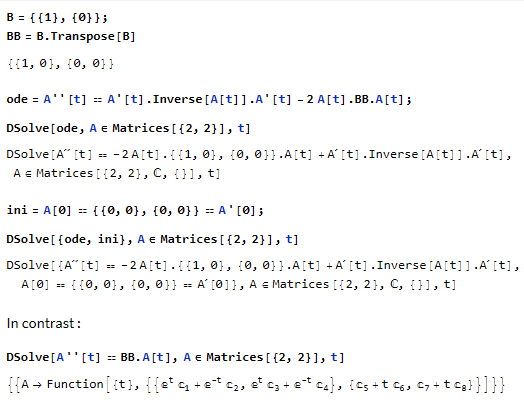In the construction of interpolations in the space of Gaussian measures, I encountered a second order matrix differential equation in the set of symmetric positive definite matrices $\mathbb{S}_+^d\subset \mathbb{R}^{d\times d}$ of the form $$ \ddot C_t = \dot C_t C_t^{-1} \dot C_t - 2 C_t \alpha\alpha^T C_t , $$ where $\alpha \in \mathbb{R}^d$ is fixed.
The system is actually a boundary value problem, with $C_0$ and $C_1$ given, however for the moment I'm happy to find any family of solutions to the equation not necessarily parametrized by the boundary values.
Particular solutions
$\alpha=0$:
For $\alpha = 0$ it follows that $\frac{d}{dt} (\dot C_t C_t^{-1}) =0$ and hence the solution is given by a matrix exponential. It can be solved for its boundary values, since the product of symmetric positive definite matrices has positive eigenvalues and hence the matrix logarithm of $C_1C_0^{-1}$ is well-defined and one gets $$ C_t = (C_1 C_0^{-1})^t C_0 := e^{t \log C_1 C_0^{-1}} C_0 $$
$1$-d:
In the one dimensional situation, one has for $\alpha \ne 0$ the explicit solution with parameters $\beta,\beta_0\in \mathbb{R}$ is given by $$ C_t = \frac{\beta^2}{\alpha^2 \cosh(\beta t + \beta_0)^2} $$
Time-independent eigenbasis:
By assuming that $C_t$ has a fixed time-independent eigenbasis, one can generalize the $1$-d solution by diagonalizing the equation in this eigenbasis. However, this only encompasses a subset of all possible solutions. In particular, this only constructs solutions for boundary values $C_0$ and $C_1$ having the same eigenbasis.
Question
Is there an explicit form of solutions to the system also for the remaining case, where the eigenbasis of $C_t$ might change in time?
Further rewritings
The $1$-d solution suggests that $s_t = C_t^{-1/2}$ in $\mathbb{S}_+^d$ might solve an easier equation. Doing the substitution, one arrives (neglecting the explicit $t$-dependency) at $$ \ddot s s^{-1} + s^{-1} \ddot s = \dot s s^{-2}\dot s + \dot s s^{-1} \dot s s^{-1} + s^{-1} \dot s s^{-1} \dot s - s^{-1} \dot s^2 s^{-1} + 2 s^{-1} \alpha \alpha^T s^{-1} . $$ However, this equation seems not much easier to solve, except we assume that $\ddot s, \dot s, s$ commute, which brings us back to the diagonal solution.

